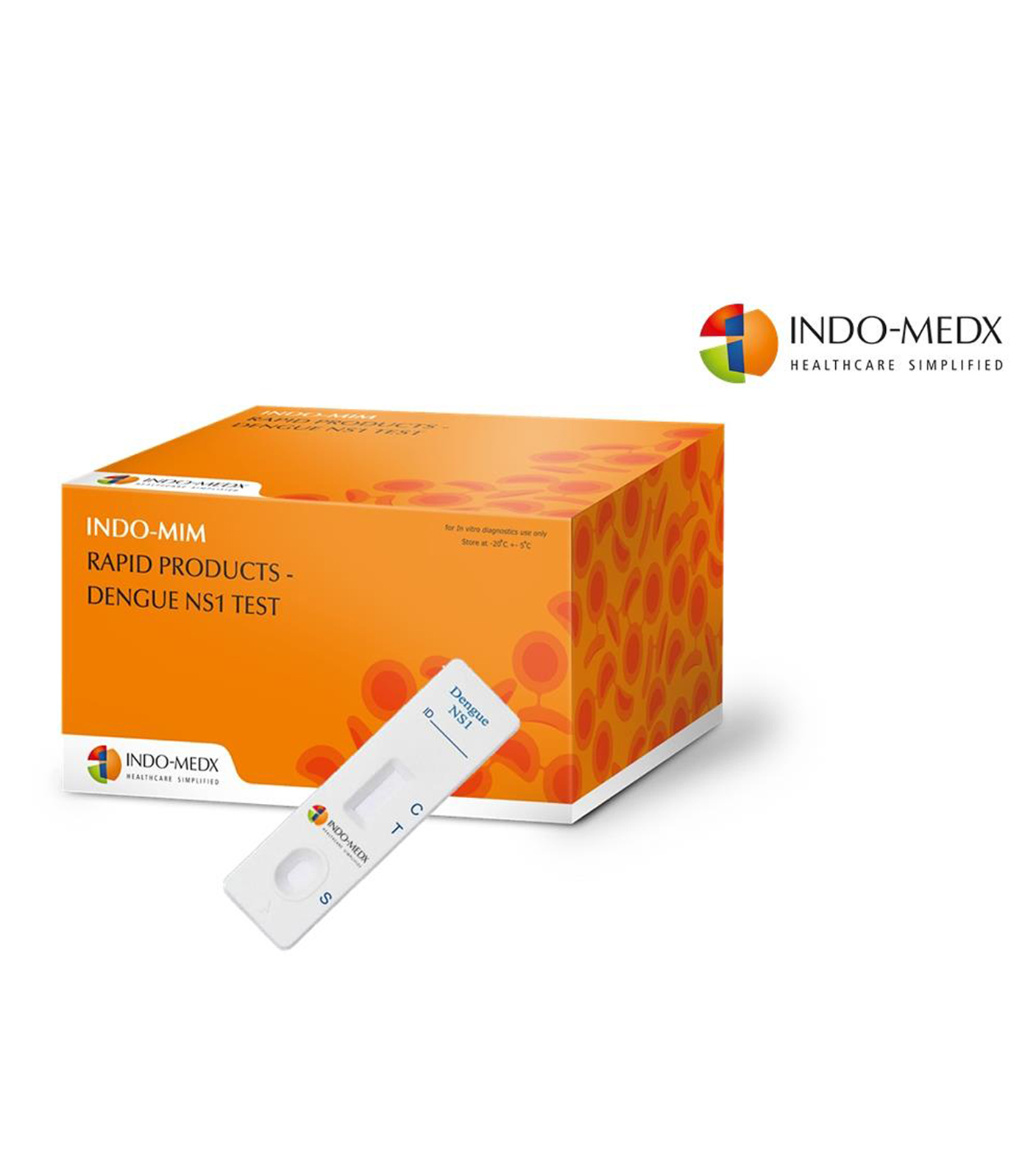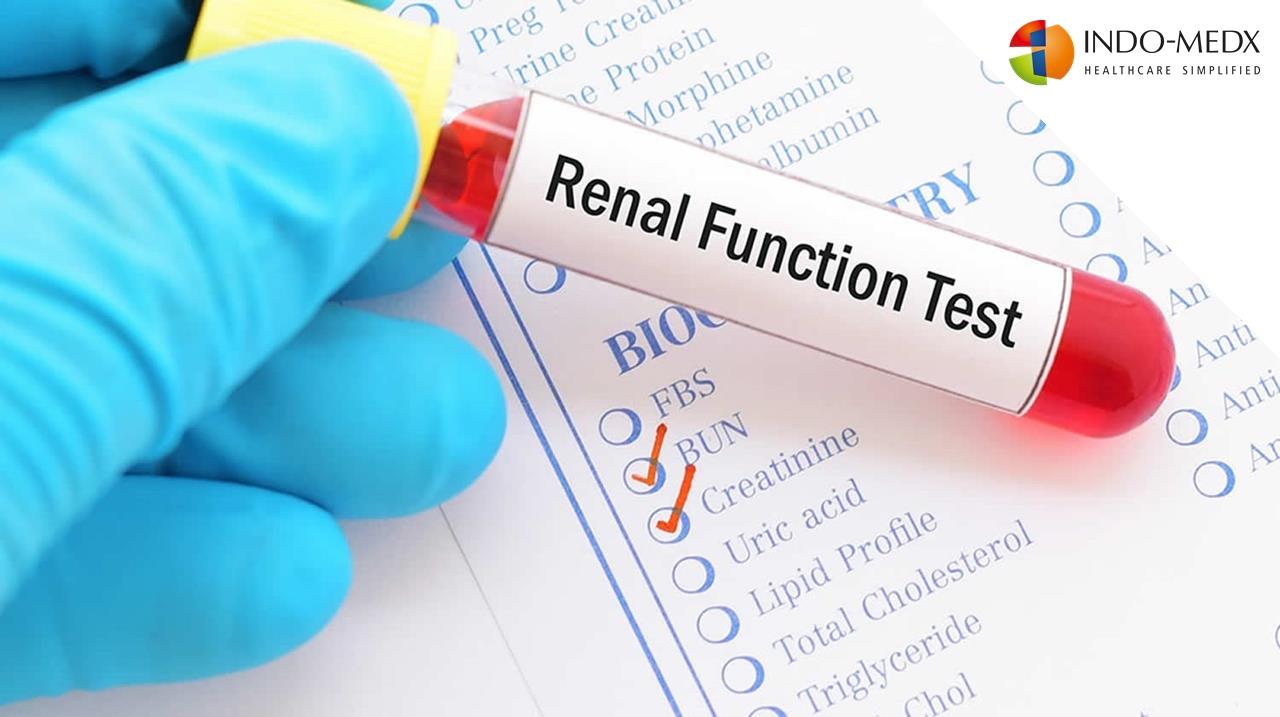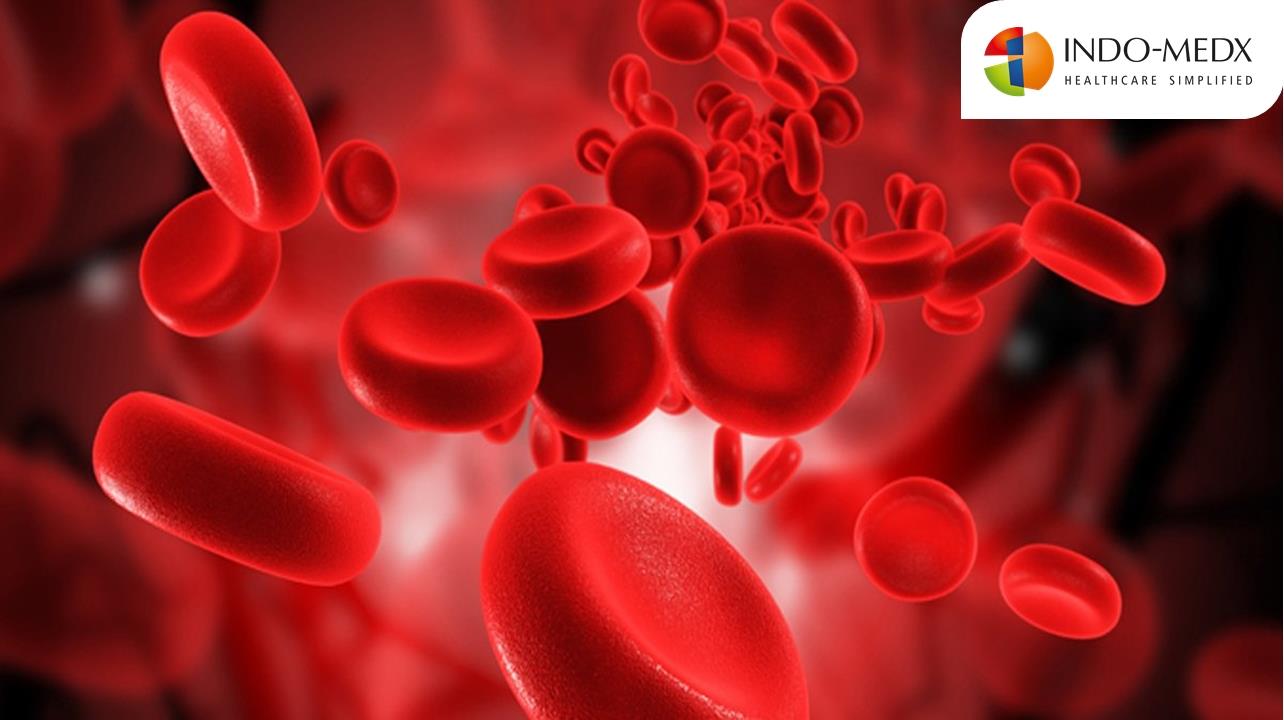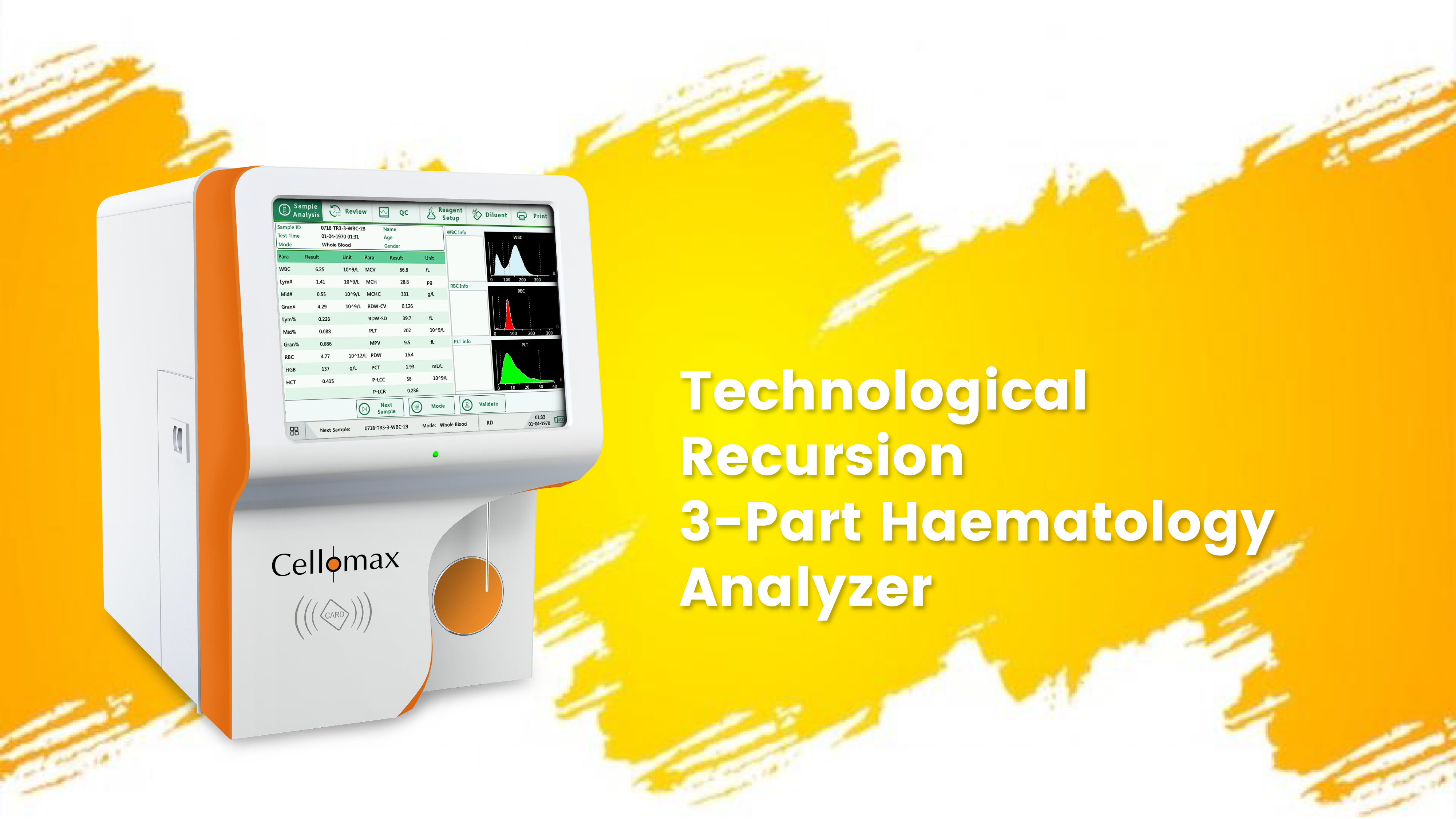
Apr 7, 2022
Blog
Rapid Tests for Dengue Fever
Dengue fever is a tropical disease that is spread by Aedes mosquitos carrying the dengue virus. The World Health Organisation (WHO) has listed dengue as one of the biggest global health threats in 2019, along with antimicrobial resistance, influenza, climate change, and HIV. Around 40% of the global population (3 billion) live in areas that put them at risk of contracting dengue fever.
Rapid Diagnostic Tests (RDT) detect the presence of viral/bacterial proteins (antigens or antibodies) expressed by the organism in a sample of body fluid drawn from a person. The sample can be blood, urine, nasal origin, etc. The easiest way to diagnose dengue is to go for a rapid test. The rapid test for Dengue NS1 Antigen is a rapid chromatographic immunoassay for the qualitative detection of dengue virus NS1 antigen in your whole blood, serum, or plasma to aid in the diagnosis of Dengue viral infection.
With 82 % sensitivity and 97% specificity, the NS1 antigen rapid test for dengue is considered highly sensitive & specific. Since the NS1 rapid test for dengue aims to detect dengue NS1 antigen, it should be performed within 5 days of onset of fever for confirming dengue fever.
Apart from the Non-structural protein 1 (NS1) rapid test for dengue, Immunoglobulin G (IgG) or Immunoglobulin M (IgM) tests or Real-time Polymerase Chain Reaction tests also are available. Besides, a Complete Blood Count (CBC) using a 3-Part Hematology analyzer is also employed to confirm the diagnosis of dengue fever.
Clinicians normally ask you to go for a rapid test for dengue to detect dengue infection by checking for the presence of viral antigens or antibodies bound to it. If you are feverish or ill after traveling to a tropical area, you have to reveal this to your doctor to correlate the chances of dengue infection.
Symptoms of Dengue Fever
Common Symptoms of Dengue3 | Signs of Severe Dengue3 |
Widespread red rash | Swollen stomach/abdominal pain |
Fever | Persistent vomiting /vomiting blood |
Severe headache | Breathing difficulties |
Muscle/Joint pain | Cold, clammy skin |
Nausea / Vomiting | Weak, fast pulse |
Loss of appetite | Bleeding gums |
Pain behind the eyes | Drowsiness/loss of consciousness |
At INDO-MEDX, we believe in making healthcare simplified. We have developed ICMR approved Rapid Test for Dengue fever to detect both NS1 antigen & IgG & IgM antibodies (Dengue NS1 & Dengue Combi) which can deliver the most sensitive and specific dengue testing.
Dengue Rapid Tests - Fast and Efficient
Here at INDO-MEDX, we are proud to supply a range of Dengue Rapid Tests to aid in the diagnosis and screening of dengue fever. Our Rapid Tests are fast and provide efficient solutions for detecting the presence of dengue viral antigens. These tests work by lateral flow immunochromatography, with results available in 10-20 minutes depending on the individual test. The Dengue Rapid Tests can be stored at room temperature, making them economical for long-haul shipping and storage.
References
1. WHO 2019: 10 Threats to global health in 2019. Last accessed 26th July 2019 at Https://Www.Who.Int/Emergencies/Ten-Threats-To-Global-Health-In-2019.
2. Carabali et al, 2015. Why are people with dengue dying? A scoping review of determinants for dengue mortality. BMC Infectious Disease 15: 301
3. NHS Conditions: Dengue. Last accessed 29th July 2019 at Https://Www.Nhs.Uk/Conditions/Dengue/
4. Beltrán-Silva et al (2018). Clinical and differential diagnosis: Dengue, chikungunya and Zika. RevistaMédica del Hospital General de México 81 (3): 146-153
5. Ruechusatsawat K, et al. Daily observation of antibody levels among dengue patients detected by enzyme-linked immunosorbent assay (ELISA). Japanese J. Trop. Med. Hygiene 1994; 22: 9-12
6. Lam SK. Dengue haemorrhagic fever. Rev. Med. Micro. 1995; 6:39-48
Dengue fever is a tropical disease that is spread by Aedes mosquitos carrying the dengue virus. The World Health Organisation (WHO) has listed dengue as one of the biggest global health threats in 2019, along with antimicrobial resistance, influenza, climate change, and HIV. Around 40% of the global population (3 billion) live in areas that put them at risk of contracting dengue fever.
Rapid Diagnostic Tests (RDT) detect the presence of viral/bacterial proteins (antigens or antibodies) expressed by the organism in a sample of body fluid drawn from a person. The sample can be blood, urine, nasal origin, etc. The easiest way to diagnose dengue is to go for a rapid test. The rapid test for Dengue NS1 Antigen is a rapid chromatographic immunoassay for the qualitative detection of dengue virus NS1 antigen in your whole blood, serum, or plasma to aid in the diagnosis of Dengue viral infection.
With 82 % sensitivity and 97% specificity, the NS1 antigen rapid test for dengue is considered highly sensitive & specific. Since the NS1 rapid test for dengue aims to detect dengue NS1 antigen, it should be performed within 5 days of onset of fever for confirming dengue fever.
Apart from the Non-structural protein 1 (NS1) rapid test for dengue, Immunoglobulin G (IgG) or Immunoglobulin M (IgM) tests or Real-time Polymerase Chain Reaction tests also are available. Besides, a Complete Blood Count (CBC) using a 3-Part Hematology analyzer is also employed to confirm the diagnosis of dengue fever.
Clinicians normally ask you to go for a rapid test for dengue to detect dengue infection by checking for the presence of viral antigens or antibodies bound to it. If you are feverish or ill after traveling to a tropical area, you have to reveal this to your doctor to correlate the chances of dengue infection.
Symptoms of Dengue Fever
Common Symptoms of Dengue3 | Signs of Severe Dengue3 |
Widespread red rash | Swollen stomach/abdominal pain |
Fever | Persistent vomiting /vomiting blood |
Severe headache | Breathing difficulties |
Muscle/Joint pain | Cold, clammy skin |
Nausea / Vomiting | Weak, fast pulse |
Loss of appetite | Bleeding gums |
Pain behind the eyes | Drowsiness/loss of consciousness |
At INDO-MEDX, we believe in making healthcare simplified. We have developed ICMR approved Rapid Test for Dengue fever to detect both NS1 antigen & IgG & IgM antibodies (Dengue NS1 & Dengue Combi) which can deliver the most sensitive and specific dengue testing.
Dengue Rapid Tests - Fast and Efficient
Here at INDO-MEDX, we are proud to supply a range of Dengue Rapid Tests to aid in the diagnosis and screening of dengue fever. Our Rapid Tests are fast and provide efficient solutions for detecting the presence of dengue viral antigens. These tests work by lateral flow immunochromatography, with results available in 10-20 minutes depending on the individual test. The Dengue Rapid Tests can be stored at room temperature, making them economical for long-haul shipping and storage.
References
1. WHO 2019: 10 Threats to global health in 2019. Last accessed 26th July 2019 at Https://Www.Who.Int/Emergencies/Ten-Threats-To-Global-Health-In-2019.
2. Carabali et al, 2015. Why are people with dengue dying? A scoping review of determinants for dengue mortality. BMC Infectious Disease 15: 301
3. NHS Conditions: Dengue. Last accessed 29th July 2019 at Https://Www.Nhs.Uk/Conditions/Dengue/
4. Beltrán-Silva et al (2018). Clinical and differential diagnosis: Dengue, chikungunya and Zika. RevistaMédica del Hospital General de México 81 (3): 146-153
5. Ruechusatsawat K, et al. Daily observation of antibody levels among dengue patients detected by enzyme-linked immunosorbent assay (ELISA). Japanese J. Trop. Med. Hygiene 1994; 22: 9-12
6. Lam SK. Dengue haemorrhagic fever. Rev. Med. Micro. 1995; 6:39-48
Dengue fever is a tropical disease that is spread by Aedes mosquitos carrying the dengue virus. The World Health Organisation (WHO) has listed dengue as one of the biggest global health threats in 2019, along with antimicrobial resistance, influenza, climate change, and HIV. Around 40% of the global population (3 billion) live in areas that put them at risk of contracting dengue fever.
Rapid Diagnostic Tests (RDT) detect the presence of viral/bacterial proteins (antigens or antibodies) expressed by the organism in a sample of body fluid drawn from a person. The sample can be blood, urine, nasal origin, etc. The easiest way to diagnose dengue is to go for a rapid test. The rapid test for Dengue NS1 Antigen is a rapid chromatographic immunoassay for the qualitative detection of dengue virus NS1 antigen in your whole blood, serum, or plasma to aid in the diagnosis of Dengue viral infection.
With 82 % sensitivity and 97% specificity, the NS1 antigen rapid test for dengue is considered highly sensitive & specific. Since the NS1 rapid test for dengue aims to detect dengue NS1 antigen, it should be performed within 5 days of onset of fever for confirming dengue fever.
Apart from the Non-structural protein 1 (NS1) rapid test for dengue, Immunoglobulin G (IgG) or Immunoglobulin M (IgM) tests or Real-time Polymerase Chain Reaction tests also are available. Besides, a Complete Blood Count (CBC) using a 3-Part Hematology analyzer is also employed to confirm the diagnosis of dengue fever.
Clinicians normally ask you to go for a rapid test for dengue to detect dengue infection by checking for the presence of viral antigens or antibodies bound to it. If you are feverish or ill after traveling to a tropical area, you have to reveal this to your doctor to correlate the chances of dengue infection.
Symptoms of Dengue Fever
Common Symptoms of Dengue3 | Signs of Severe Dengue3 |
Widespread red rash | Swollen stomach/abdominal pain |
Fever | Persistent vomiting /vomiting blood |
Severe headache | Breathing difficulties |
Muscle/Joint pain | Cold, clammy skin |
Nausea / Vomiting | Weak, fast pulse |
Loss of appetite | Bleeding gums |
Pain behind the eyes | Drowsiness/loss of consciousness |
At INDO-MEDX, we believe in making healthcare simplified. We have developed ICMR approved Rapid Test for Dengue fever to detect both NS1 antigen & IgG & IgM antibodies (Dengue NS1 & Dengue Combi) which can deliver the most sensitive and specific dengue testing.
Dengue Rapid Tests - Fast and Efficient
Here at INDO-MEDX, we are proud to supply a range of Dengue Rapid Tests to aid in the diagnosis and screening of dengue fever. Our Rapid Tests are fast and provide efficient solutions for detecting the presence of dengue viral antigens. These tests work by lateral flow immunochromatography, with results available in 10-20 minutes depending on the individual test. The Dengue Rapid Tests can be stored at room temperature, making them economical for long-haul shipping and storage.
References
1. WHO 2019: 10 Threats to global health in 2019. Last accessed 26th July 2019 at Https://Www.Who.Int/Emergencies/Ten-Threats-To-Global-Health-In-2019.
2. Carabali et al, 2015. Why are people with dengue dying? A scoping review of determinants for dengue mortality. BMC Infectious Disease 15: 301
3. NHS Conditions: Dengue. Last accessed 29th July 2019 at Https://Www.Nhs.Uk/Conditions/Dengue/
4. Beltrán-Silva et al (2018). Clinical and differential diagnosis: Dengue, chikungunya and Zika. RevistaMédica del Hospital General de México 81 (3): 146-153
5. Ruechusatsawat K, et al. Daily observation of antibody levels among dengue patients detected by enzyme-linked immunosorbent assay (ELISA). Japanese J. Trop. Med. Hygiene 1994; 22: 9-12
6. Lam SK. Dengue haemorrhagic fever. Rev. Med. Micro. 1995; 6:39-48
Dengue fever is a tropical disease that is spread by Aedes mosquitos carrying the dengue virus. The World Health Organisation (WHO) has listed dengue as one of the biggest global health threats in 2019, along with antimicrobial resistance, influenza, climate change, and HIV. Around 40% of the global population (3 billion) live in areas that put them at risk of contracting dengue fever.
Rapid Diagnostic Tests (RDT) detect the presence of viral/bacterial proteins (antigens or antibodies) expressed by the organism in a sample of body fluid drawn from a person. The sample can be blood, urine, nasal origin, etc. The easiest way to diagnose dengue is to go for a rapid test. The rapid test for Dengue NS1 Antigen is a rapid chromatographic immunoassay for the qualitative detection of dengue virus NS1 antigen in your whole blood, serum, or plasma to aid in the diagnosis of Dengue viral infection.
With 82 % sensitivity and 97% specificity, the NS1 antigen rapid test for dengue is considered highly sensitive & specific. Since the NS1 rapid test for dengue aims to detect dengue NS1 antigen, it should be performed within 5 days of onset of fever for confirming dengue fever.
Apart from the Non-structural protein 1 (NS1) rapid test for dengue, Immunoglobulin G (IgG) or Immunoglobulin M (IgM) tests or Real-time Polymerase Chain Reaction tests also are available. Besides, a Complete Blood Count (CBC) using a 3-Part Hematology analyzer is also employed to confirm the diagnosis of dengue fever.
Clinicians normally ask you to go for a rapid test for dengue to detect dengue infection by checking for the presence of viral antigens or antibodies bound to it. If you are feverish or ill after traveling to a tropical area, you have to reveal this to your doctor to correlate the chances of dengue infection.
Symptoms of Dengue Fever
Common Symptoms of Dengue3 | Signs of Severe Dengue3 |
Widespread red rash | Swollen stomach/abdominal pain |
Fever | Persistent vomiting /vomiting blood |
Severe headache | Breathing difficulties |
Muscle/Joint pain | Cold, clammy skin |
Nausea / Vomiting | Weak, fast pulse |
Loss of appetite | Bleeding gums |
Pain behind the eyes | Drowsiness/loss of consciousness |
At INDO-MEDX, we believe in making healthcare simplified. We have developed ICMR approved Rapid Test for Dengue fever to detect both NS1 antigen & IgG & IgM antibodies (Dengue NS1 & Dengue Combi) which can deliver the most sensitive and specific dengue testing.
Dengue Rapid Tests - Fast and Efficient
Here at INDO-MEDX, we are proud to supply a range of Dengue Rapid Tests to aid in the diagnosis and screening of dengue fever. Our Rapid Tests are fast and provide efficient solutions for detecting the presence of dengue viral antigens. These tests work by lateral flow immunochromatography, with results available in 10-20 minutes depending on the individual test. The Dengue Rapid Tests can be stored at room temperature, making them economical for long-haul shipping and storage.
References
1. WHO 2019: 10 Threats to global health in 2019. Last accessed 26th July 2019 at Https://Www.Who.Int/Emergencies/Ten-Threats-To-Global-Health-In-2019.
2. Carabali et al, 2015. Why are people with dengue dying? A scoping review of determinants for dengue mortality. BMC Infectious Disease 15: 301
3. NHS Conditions: Dengue. Last accessed 29th July 2019 at Https://Www.Nhs.Uk/Conditions/Dengue/
4. Beltrán-Silva et al (2018). Clinical and differential diagnosis: Dengue, chikungunya and Zika. RevistaMédica del Hospital General de México 81 (3): 146-153
5. Ruechusatsawat K, et al. Daily observation of antibody levels among dengue patients detected by enzyme-linked immunosorbent assay (ELISA). Japanese J. Trop. Med. Hygiene 1994; 22: 9-12
6. Lam SK. Dengue haemorrhagic fever. Rev. Med. Micro. 1995; 6:39-48



